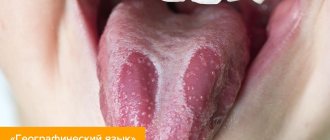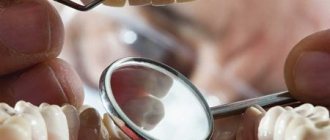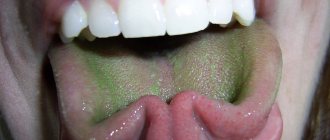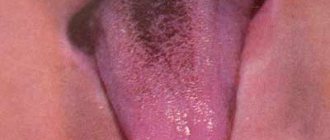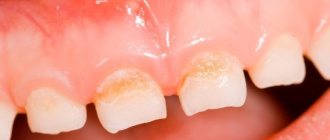Why clean your tongue?
The human tongue is involved in chewing, salivation and the formation of taste perceptions. Everything we drink and eat every day comes into contact with this organ. Food remains accumulate in the teeth, but on the tuberous surface of the tongue, covered with a mucous membrane and numerous papillae, there are several times more of them. Some microbes die or are removed by salivation, but a film remains in hard-to-reach places in the cavity, for example at the root of the tongue. Over time, it thickens, spreads to other areas and gradually covers the entire surface.
Plaque on the tongue must be removed daily. The best way to deal with this is scrapers, spoons, brushes, special gels and rinses. Regular use of cleaning products eliminates unpleasant odors and stubborn deposits, and reduces the risk of developing dental diseases. In addition, the effect on the receptors is a good massage for the tongue. Such procedures sharpen the sense of taste and stimulate the functioning of internal organs.
Black tongue
Fungus
Gastritis
Colitis
24125 September 28
IMPORTANT!
The information in this section cannot be used for self-diagnosis and self-treatment.
In case of pain or other exacerbation of the disease, diagnostic tests should be prescribed only by the attending physician. To make a diagnosis and properly prescribe treatment, you should contact your doctor. Black tongue: causes of appearance, what diseases it occurs with, diagnosis and treatment methods.
Definition
Black tongue is a condition in which a person's tongue is completely or partially dark or black in color. This symptom is more common among older people, although it occurs in all age groups, and is more common in men than women.
Varieties of black tongue
Normally, the tongue has a pale pink color, it is moist, with a smooth surface and clearly visible papillae.
Plaque on the tongue is formed by food debris and exfoliated dead cells of the mucous membrane of the tongue, which can become saturated with food dyes. The appearance of a thin, white, easily cleaned plaque that does not have an unpleasant odor is considered acceptable, and the formation of a dense plaque with a non-physiological color is regarded as a pathology.
On the surface of the tongue there may be individual black dots, one large spot, the tongue may be colored on the sides or completely.
Most often, a black tongue is caused by staining from plaque, such as food or medications, but it can also result from excess melanin deposits or lead poisoning.
In addition, there is such a thing as “black hairy tongue” - a benign and temporary phenomenon in which the filiform papillae of the tongue lengthen, and the keratinized cells of the epithelium of the tongue do not exfoliate and become black or brown due to the activity of certain bacteria and fungi. The length of the papillae can reach 1-3 cm, and the diameter is 2-3 mm. Hyperplastic filiform papillae are located mainly on the posterior and middle third of the dorsum of the tongue. The tongue takes on a “hairy” or “furry” appearance. The disease occurs in both children and adults, but is much more common in older people. Patients may complain of a foreign body sensation on the tongue, itching of the palate, burning of the tongue, dry mouth, impaired taste sensitivity, and bad breath. If enlarged taste buds touch the palate, a gag reflex occurs, especially during conversation.
Possible reasons for the appearance of a black tongue
A black tongue is often associated with poor oral hygiene. In addition, people who abuse tea and coffee, smoke, suffer from alcoholism, and use intravenous drugs are at risk. Dry mouth contributes to the tongue turning black when, due to insufficient salivation, more bacteria accumulate on the tongue, the activity of which leads to the plaque becoming pathologically colored. Severe dehydration of the body is accompanied by the formation of a dark, sometimes almost black coating, which is difficult to remove from the tongue.
Some medications give the tongue a black color, for example, activated carbon, iron, bismuth, or antibiotics that disrupt the balance of microflora in the mouth.
A black tongue can also be observed in harmless situations, for example, after eating blueberries, red wine, and foods that contain dyes (sweets, chewing gum, lollipops).
Diseases that can cause the tongue to turn black
A black tongue is often observed with severe advanced candidiasis of the oral cavity, with sore throat, with pathology of the gastrointestinal tract (diseases of the liver, gallbladder, pancreas), adrenal insufficiency, acid-base imbalance and with the development of increased acidity (acidosis). If a chromogenic fungus has settled in the mouth, then the gums, teeth and tongue become covered with a black coating with a greenish tint. In adrenal insufficiency (Addison's disease), one of the signs of the disease is hyperpigmentation of the skin and mucous membranes due to increased levels of melanin. Pigmentation of the oral mucosa occurs, spots and stripes of brown or grayish-black color appear on the red border of the lips, in the corners of the mouth, on the gums and on the lateral surfaces of the tongue.
Predisposing factors to hypertrophy (enlargement) of the papillae with a black hairy tongue can be diseases of the gastrointestinal tract (anacidic gastritis, hypoacid gastritis, colitis, infectious diseases). In some cases, the formation of a black hairy tongue occurs against the background of a deficiency in the body of riboflavin (vitamin B2). In addition, black hairy tongue occurs with pulmonary tuberculosis, papillary pigmentary dystrophy, and after the use of certain medications (for example, antibiotics).
Which doctors should I contact if a black tongue appears?
If you have an oral disease that has caused the formation of a black coating on the tongue, you should consult a dentist.
If plaque is associated with an infectious disease, for example, sore throat or candidiasis, then treatment is carried out.
For diseases of the gastrointestinal tract, you should contact.
If the cause of the black tongue is Addison's disease (adrenal insufficiency), then consultation is required.
Diagnostics and examinations for the appearance of a black tongue
Some tests may be needed to determine the cause of tongue discoloration:
- general blood analysis;
Healthy and unhealthy coating on the tongue: how to determine
Even in the time of Hippocrates, healers asked patients to stick out their tongues. By assessing the thickness and color of the organ, doctors made conclusions about the state of human health. Centuries have passed, but this method of primary diagnosis is still used by many therapists, dentists, pediatricians, and otolaryngologists.
The plaque itself does not cause disease. It has various causes for its formation: poor hygiene, smoking, dyes in products, diseases of the teeth and oral cavity. If you are healthy, do not be surprised by the appearance of deposits on your tongue in hot weather, in the morning after waking up, or during the day after eating. This is normal and should not cause concern. The pale pink coating has almost no odor, changes color when using coloring products, and is easily removed with proper hygiene.
Pathology is considered to be a very dense coating through which the color of the tongue is not visible. Usually the deposits smell unpleasant, redness and cracks are visible on the surface, and after cleansing the condition of the tongue does not change. Unhealthy plaque can be brown, green, yellow and even black.
What it is
A black coating on the tongue usually appears with severe damage to the digestive tract.
Moreover, the more complex the patient’s condition, the darker and denser the plaque. It most often forms on the surface of the tongue, but can also cover the teeth and the inner surface of the cheeks in a thick layer. The black and green coating can scare anyone. But before you panic, you should carefully analyze what you ate in the last 24 hours. After all, there is a whole list of foods, the consumption of which stains the tongue, lips and teeth black or dark. These products include, first of all, blueberries. Consuming activated charcoal can also temporarily turn your tongue black.
A black coating on the tongue of an adult can also appear in the presence of a disease such as acidosis. Acidosis disrupts the acid-base balance in the body. Those who eat little fresh vegetables and fruits, while leaning on flour and sweets, are susceptible to this disease. If the doctor confirms that the black plaque on the tongue and teeth is due to acidosis, it is necessary to cleanse the body of toxins.
Previously, it was believed that a black coating on the tongue indicates such a terrible disease as cholera.
Modern doctors do not support this statement, but are still inclined to believe that a black coating on the tongue appears most often with acidosis.
The appearance of such formations has various reasons and factors.
- Decreased immunity.
- Dental diseases (gingivitis, stomatitis, caries, periodontitis, etc.).
- Infectious diseases.
- Gastrointestinal problems.
- Infection of the body with helminths.
- Pathologies of the heart, lungs, thyroid gland.
- Taking medications, etc.
In difficult cases, when plaque is one of the accompanying symptoms of serious diseases, consult a doctor. The disease must be identified and cured, otherwise no means to improve the microflora will help.
Reasons for appearance
There may be quite a few reasons why a patient has a black coating on his tongue. Let's consider the most likely of them:
- acidosis (disturbance of the acid-base balance in the human body);
- diseases of the pancreas, gall bladder and digestive organs;
- presence of cholera infection;
- development of acute infectious diseases;
- the appearance and reproduction of chromogenic fungus in the oral cavity.
Let's look at all these reasons in more detail.
Angina
A black coating on the tongue in the morning may indicate a sore throat, especially if the patient has a very high fever and there is an acute respiratory viral infection in the body. In this case, you need to consult a doctor so that he can establish the correct diagnosis and prescribe adequate treatment. If you have a sore throat, a black coating on the tongue does not require any separate treatment; after recovery, it will disappear on its own. During illness, oral hygiene procedures should be carried out very carefully, cleaning not only the teeth and gums, but also the tongue.
Acidosis
As a result of a change in the acid-base balance towards increasing acidity, the patient's tongue may have a black or dark coating. Only an experienced doctor can make a diagnosis based on clinical studies and tests. Therefore, if you are concerned about a dark coating on your tongue, you should consult a general practitioner, undergo an examination, and only then begin treatment.
Diseases of the digestive tract
If you have a black coating on your tongue, the reasons may be the development of diseases of the gastrointestinal tract, primarily the pancreas and gall bladder. Many patients complain that along with the plaque there is a bitterness in the mouth, although they have no problems with the stomach. In fact, the disease can occur in a latent form, without showing itself for the time being. At the first signs, you should consult a doctor and take a blood test to rule out the presence of serious pathologies of the gastrointestinal tract.
Antibiotics
A black coating on the tongue after antibiotics appears quite rarely and usually signals a weakened human immune system. After all, antibiotics are not taken on their own; they are prescribed only for serious indications. And, accordingly, such a patient’s immunity is weakened. Taking antibiotics is also associated with the risk of multiplying a fungal infection, and the development of chromogenic fungus in the oral cavity only increases the risk of black plaque formation.
In the morning
Dark plaque on the tongue and teeth in the morning is a fairly common phenomenon, since bacteria and microorganisms actively multiplied in the patient’s mouth overnight. It is extremely important to brush your teeth before going to bed, this way we reduce the number of pathogenic bacteria and prevent the appearance of dense plaque.
Thrush
Black coating on the tongue and thrush are not as closely related as they might seem. Most often, with thrush, a white coating appears, which is quite difficult to remove; soon it appears again and again. But if the disease is in an extremely advanced state, the coating on the tongue may darken and resemble black in color.
Bitterness in the mouth
A black coating on the tongue and bitterness in the mouth may indicate diseases of the pancreas and gall bladder. With these diseases, dehydration of the body often occurs, which is expressed in the appearance of bitterness in the mouth.
Sometimes patients ask why a black coating appears on the tongue if everything is fine with the digestive tract. We remind you that sometimes diseases occur in the so-called latent form, in which the patient is not even aware of the presence of the disease. And dark language should definitely alert you.
Chromogenic fungus
Black-green plaque may be the cause of chromogenic fungus in the oral cavity. In this case, plaque covers not only the patient’s tongue, but also his teeth and gums. Dark green spots appear on the surface of the tooth enamel. In this case, it is necessary to observe extremely careful oral hygiene.
Products for daily tongue hygiene
You need to brush your tongue at least 2 times a day. It is not advisable to use a regular toothbrush, since high and medium hard bristles can injure the soft surface and cause a gag reflex. At home, it is safer and more convenient to use special devices. They do not have a significant functional difference, so when choosing, you can only be guided by personal preferences.
Today, you can easily purchase products from well-known brands Curaprox, Dentaid, Jetpik, One Drop Only, Miradent, Pierrot, etc. The range of products from different manufacturers includes everything you need for complete, high-quality oral care.
Scrapers
resemble a spatula. A simple design can be made of silicone or plastic, less often of metal and wood. This easy-to-use device gently cleanses the surface of the tongue without causing a gag reflex. The scraper blades conform to the shape of the tongue and are easily washed with water.

